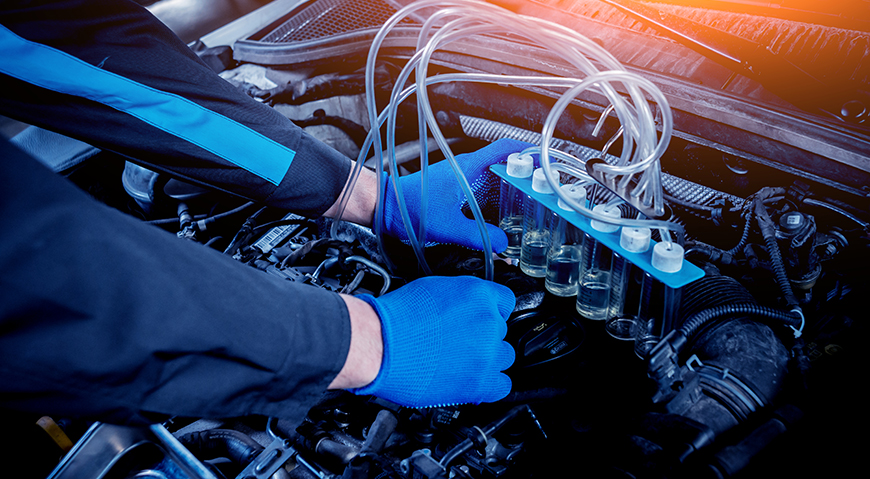One of the most crucial components of a car’s engine is the fuel injector. It is responsible for delivering fuel at the correct time so that efficient and clean combustion is possible. But without regular fuel injector cleaning and maintenance, cloggings may occur, and faults may develop in the injector. Therefore, as the owner of your car, you have to know how to notice the signs of a failed car fuel injector and how to fix the issues. This blog discusses all the information you must know about how fuel injectors work and what common symptoms arise when something goes wrong.
What are fuel injectors?
Fuel injectors are installed in a car’s engine to spray fuel using electronic valves. They can alternatingly open and close multiple times in a second and have an atomising nozzle that contributes to even distribution of petrol or diesel for efficient combustion and enhanced car performance. In general, one fuel injector is installed for one cylinder in a car.
How do fuel injectors work?
Fuel injectors control the fuel volume delivered to the combustion chamber, thus making sure the correct amount of fuel is injected at the right time. The process involves the following steps.
- First, the fuel pump pushes the diesel or petrol through the fuel lines to the fuel injectors.
- Then, the engine control unit (ECU) uses sensors to determine the perfect time to trigger the injectors and deliver fuel into the combustion chamber.
- Once the injector gets activated by the ECU, the fuel is sprayed through the nozzles. As the sizes of the nozzles are small, fuel can burn more effectively.
What are the signs and symptoms of a failed fuel injector?
If not checked, fuel injectors can develop various faults that may affect their performance or cause breakdowns. It happens mostly when the injector becomes clogged with debris or any electrical or mechanical issues arise. Whatever signs you notice, do not waste any more minutes and should take your car to a top-rated car repair shop.
The common signs are given below.
Check engine warning light
The most typical sign of a faulty fuel injector that you may come across is the check engine warning light that appears on the dashboard. If the injector starts malfunctioning, the light will switch on. The warning light gets triggered by the ECU when too little or too much fuel is getting injected.
Vibrating or misfiring engine
If your car misfires frequently or you experience a delay after pressing the accelerator pedal, the reason may be a failed fuel injector. It happens mostly when there is a blockage in the nozzle.
If the injector cannot deliver the exact amount of fuel needed by the ECU, the air-fuel mix in the combustion chamber will be affected, thus leading to misfiring or an abrupt drop in acceleration. It is the reason why you should make sure that your car fuel injectors are always free from any cloggings o blockages.
Fluctuation in the power
If your car is inconsistently revving or the RPM gauge is fluctuating, it may be a sign of a faulty fuel injector. When there is clogging or blockage in the fuel injection system, an inconsistent amount of fuel is supplied to the engine, which gives rise to poor fuel performance.
Rough idle
If you notice any major change in your car’s idle noise, it is a fuel injector problem. A rough sound means the fuel injectors do not deliver enough fuel. Like misfiring, the reason behind this problem is also directly related to the clogging of nozzles, which affects the spray and atomisation of the car fuel.
Even though there are other reasons behind a rough idle noise, including a dirty air filter or a bad spark plug, clogged injectors are the most common of them.
Engine stalling
If you find your engine randomly stalling, the most common reason may be the lack of fuel being sprayed from the injectors to the engine. If the injectors deliver too little fuel, the engine control unit will stop the engine, leading to a stall.
This situation usually occurs when there is any blockage in the nozzles or leak in the fuel where the fuel lines and injector connect.
Fuel leak
Are you experiencing a strong fuel smell while driving, or your car is showing other symptoms described above? If yes, the cause may be a fuel leak. These leaks can occur where the two injectors meet or on the injector itself when not enough care has been taken.
You can check the fuel injector to see whether there is any leak because if it happens, you will find fuel close to the injector. Noticing a drop in the fuel level is also another way to detect this issue. Whatever the reason, you should take your car for regular fuel injector service, thereby avoiding these problems.
Poor fuel economy
A failed fuel injector can give rise to a major drop in the fuel economy. It happens because the required amount of fuel in the engine control unit is not getting met. Thus, the less fuel that reaches the engine lowers the car’s fuel economy. Clogging or leaking injectors can lead to poor fuel economy.
What is the lifespan of a diesel car fuel injector?
Fuel injectors in diesel cars usually have a shorter lifespan, and thus, frequent replacement is required for better car performance. Generally, the lifespan of a diesel fuel injector is about 150000 kilometres.
How to avoid problems: maintaining fuel injectors
To avoid premature damage or wear, always make sure that the symptoms mentioned above are addressed as early as possible. Experts always recommend using fuel of high quality that suits your vehicle. Regular inspection of engine should be done to make sure there are no internal corrosions. Using lubricants and fuel additives can also be beneficial to stabilise the engine.

